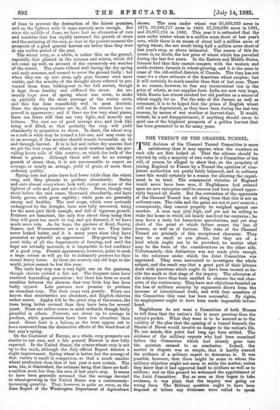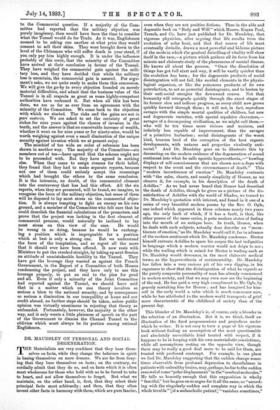THE VERDICT ON THE CHANNEL TUNNEL.
THE decision of the Channel Tunnel Committee is more satisfactory than it may appear, when the numbers on each side are first looked at. That the scheme should be
rejected by only a majority of two votes in a Committee of ten will, of course, be alleged to show that, on the propriety of joining England to France by a Tunnel the opinions of com- petent authorities are pretty fairly balanced, and in ordinary cases this would certainly be a reason for allowing the experi- ment to be tried. The commercial victories of England cases this would certainly be a reason for allowing the experi- ment to be tried. The commercial victories of England would never have been won, if Englishmen had entered upon no new enterprise until its success had been placed appar- ently beyond all doubt. But the contention of the opponents of the Channel Tunnel has all along been that this is not an ordinary case. The risks and the gains are not in pare materia ; consequently, they cannot properly be weighed against one another. A man may play high, and yet not be willing to stake the home in which his family has lived for centuries ; he may have a taste for hazardous speculations, and yet stop short of the point at which failure means the loss of honour, as well as of fortune. The risks of the Channel Tunnel are precisely of this exceptional character. They may be as small as you please, but they are of a kind which ought not to be provoked, no matter what may be the force of the considerations on the other side.
Unfortunately, this distinction was not made plain enough in the reference under which the Joint Committee was appointed. They were instructed to investigate the whole subject, and the result was that a great part of their labours dealt with questions which ought to have been treated as be- side the mark at that stage of the inquiry. The advocates of the scheme have thus been enabled to obscure the real char- acter of the controversy. They have met objections founded on the loss of military security by arguments drawn from the increase of international trade, and with four members of the Committee this ruse has been successful. By rights, its employment ought to have been made impossible before- hand.
Englishmen do not want a Committee of both Houses to tell them that the nation's life is more precious than the nation's pocket. What they want is to be assured as to the validity of the plea that the opening of a tunnel beneath the Straits of Dover would involve no danger to the nation's life. To our minds, this point had long ago been settled. The evidence of the military experts who had been examined before the Committee which had already gone into the question seemed to us conclusive. Indeed, the matter in dispute was so simple, that it hardly wanted the evidence of a military expert to determine it. It was possible, however, that there might be some to whom the military objection might not seem to settle the matter, unless they knew that it had approved itself to civilians as well as to soldiers ; and on this ground we welcomed the appointment of the Joint Committee. But as soon as they began to take evidence, it was plain that the inquiry was going on wrong lines. The Military question ought to have been disposed of before any witnesses were called to speak
to the Commercial question. If a majority of the Com- mittee had reported that the military objection was purely imaginary, then would have been the time to consider what the Tunnel would do for Trade. As it was, Englishmen seemed to be asking one another at what price they would consent to sell their skins. They were brought down to the level of the Chinaman who will suffer death in your stead, if you only pay him highly enough. It is under the influence probably of this error, that the minority of the Committee have arrived at their conclusion in favour of the Tunnel. They have weighed the commercial gain against the mili- tary loss, and they have decided that while the military loss is uncertain, the commercial gain is assured. For argu- ment's sake, we are quite ready to make them this concession. We will give the go-by to every objection founded on merely material difficulties, and admit that the business value of the Tunnel is in all respects as great as some highly-competent authorities have reckoned it. But when all this has been done, we are as far as ever from an agreement with the minority of the Committee. We come back to the objection with which we started. The risks and the gains are not in pari materia. We are asked to set the certainty of great riches for nine years against the chance of invasion in the tenth, and the answer is that no conceivable increase of wealth, whether it went on for nine years or for ninety-nine, would be worth weighing against even a small diminution of the unique security against invasion which we at present enjoy.
The mischief of too wide an order of reference has been shown in another way. The majority of the Committee—six members out of ten—have agreed that the scheme ought not to be proceeded with. But they have agreed in nothing else. When they came to assign reasons for their belief, they found that they had to make separate reports, because not one of them could entirely accept the reasonings which had brought the others to the same conclusion. It is the intrusion, no doubt, of the commercial element into the controversy that has had this effect. All the six reports, when they are presented, will be found, we imagine, to recognise the force of the military objection, but some of them will be disposed to lay most stress on the commercial objec- tion. It is always tempting to fight an enemy on his own ground, and a member of the Committee who felt sure that he could demolish the financial calculations of the promoters, and prove that the project was lacking in the first element of commercial promise, would naturally be inclined to lay most stress on this view of the case. He would be wrong in so doing, because he would be exchang- ing a position which is impregnable for a position which at best is only a strong one. But we understand the force of the temptation, and so regret all the more that it should ever have been offered. It now rests with Ministers to put the crooked straight, by taking up next Session an attitude of unmistakeable hostility to the Tunnel. They have got the leverage they wanted as against the French Government, in the Report of a Committee of both Houses condemning the project, and they have only to use this leverage properly, to put an end to the plan for good and all. Even if only a minority of the Joint Committee had reported against the Tunnel, we should have said that in a matter which on one theory involves so serious a blow to the national security, and by consequence so serious a diminution in our tranquillity at home and our credit abroad, no further steps should be taken, unless public opinion was virtually unanimous in rejecting that theory as unfounded. Fortunately, however, the majority is the other way, and it only wants a little plainness of speech on the part of the Government to dismiss the Channel Tunnel to the oblivion which must always be its portion among rational Englishmen.



































 Previous page
Previous page